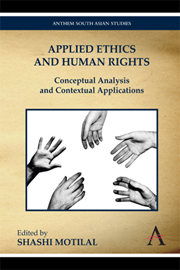Book contents
- Frontmatter
- Contents
- Preface
- Introduction
- Part One Rights, Obligations and Responsibilities
- 1 Applying Ethics: Modes, Motives and Levels of Commitment
- 2 Jurisprudence and the Individual: Bridging the General and the Particular
- 3 Why Moral Relativism Does Not Make Sense
- 4 Human Rights – A Theoretical Foray
- 5 Moral Relativism and Human Rights
- 6 Complicity and Responsibility
- 7 Dharma: The Overriding Principle of Indian Life and Thought
- 8 Moral Foundations of Social Order as Suggested in the Vaiśeṣikasūtras
- 9 Modern Western Conception of Justice as Equality before the Law and Dharmaśāstras
- Part Two Human Rights Issues
- Notes on Contributors
7 - Dharma: The Overriding Principle of Indian Life and Thought
from Part One - Rights, Obligations and Responsibilities
Published online by Cambridge University Press: 05 March 2012
- Frontmatter
- Contents
- Preface
- Introduction
- Part One Rights, Obligations and Responsibilities
- 1 Applying Ethics: Modes, Motives and Levels of Commitment
- 2 Jurisprudence and the Individual: Bridging the General and the Particular
- 3 Why Moral Relativism Does Not Make Sense
- 4 Human Rights – A Theoretical Foray
- 5 Moral Relativism and Human Rights
- 6 Complicity and Responsibility
- 7 Dharma: The Overriding Principle of Indian Life and Thought
- 8 Moral Foundations of Social Order as Suggested in the Vaiśeṣikasūtras
- 9 Modern Western Conception of Justice as Equality before the Law and Dharmaśāstras
- Part Two Human Rights Issues
- Notes on Contributors
Summary
Dharma has been one of the most dominant and pervasive concepts of Indian view and way of life. It has been the foundation of the entire life and culture of India underlying all her achievements in the fields of science, philosophy, literature, arts, morality, sociality, polity, religion and spirituality. As Prof. Cromwell Crawford has truly opined, ‘To know India try grasping the myriad forms of Dharma, for in the depths of this single word lies an entire civilization’. (Crawford, 1967: XVI) Dharma is an extremely rich and polymorphous concept embracing diverse though not unrelated senses. In the course of several centuries it has acquired wide ramifications of meanings and has been used in different contexts–metaphysical, moral, religious, artistic, social, political, legal, etc. But its basic law-centered meaning has remained unchanged. Because of its proliferous nature no one all-inclusive definition of dharma can be provided and its precise meaning is to be understood from the context in which it has been used.
Indian culture is characterized by a spiritual orientation and an integral and holistic approach. Its varied and variegated fabric is interwoven with multiple ideas and ideals, thoughts and practices among which the notion of dharma is both pivotal and foundational. It is like a luminous jewel that not only enlightens Indian culture but also has the potentiality of illuminating the entire world culture and civilization.
- Type
- Chapter
- Information
- Applied Ethics and Human RightsConceptual Analysis and Contextual Applications, pp. 91 - 100Publisher: Anthem PressPrint publication year: 2010



